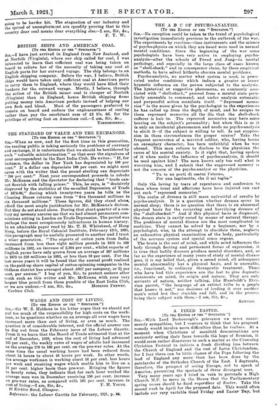THE STANDARD OF VALUE AND THE EXCHANGES. (To THE EDITOR
OF THE " SPECTATOR.")
Sts,—When as now, and for the first time in this generation, the reading public is taking seriously the problems of currency and exchange, it is unfortunate that we should be bewildered by such " valuable misinformation " as that over the signature of your correspondent in the East India Club. He writes : " If, for instance, the dollar in New York has depreciated by 100 per cent." If a dollar can depreciate 100 per cent. we might next agree with the writer that the pound sterling can depreciate " 200 per cent." Next your correspondent proceeds to rebuke Mr. McKenna and the Spectator for declaring that " trade can- not flourish with falling prices." This, he says, is " decisively disproved by the statistics of the so-called Depression of Trade of 1874-96," during which twenty-two years he tells us the Clearing House returns rose from " five thousand millions to six thousand millions." These figures, did they stand alone, afford the most ample justification for Mr. McKenna's dictum. But they do not stand alone. During that short quarter of a cen- tury my memory assures me that we had almost permanent com- missions sitting in London on Trade Depression. The period was perhaps the most conspicuously infructuous in human history.
in an admirable paper read by Mr. T. H. Whitehead, of Hong Kong, before the Royal Colonial Institute, February 12th, 1895. this paragraph may be usefully presented to another and I trust a wiser generation. "The exports of cotton yarn from India increased from less than eight million pounds in 1876 to 189 millions in 1892, an increase of 2,364 per cent., whilst exports of English yarns have only grown from an average of 207 millions in 1873 to 228 millions in 1893, or less than 10 per cent. For the last seven years it will be found that the annual profit realized on thepaid-up share capital of cotton-spinning companies in the Oldham district has averaged about £917 per company, or 2-1 per cent, per annum." I beg of you, Sir, to protect seekers after truth such as this writer and Mr. McKenna with your very largest blue pencil from these pundits of the East India Club,


































 Previous page
Previous page